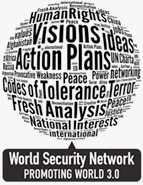Iraqi Religious Shiite and Sunni Religious Leaders: A Fatwa Against Sectarian Violence

Recently, a group of Iraqi senior Sunni and Shia religious leaders met in Beirut - supported by the World Security Network Foundation - to discuss the main problems of Iraq and to find a way to take action against them. Father Canon Andrew White, the vicar of Baghdad and President of "Foundation for Relief and Reconciliation in the Middle East" (FRRME), led the talks with the support of Robert C. McFarlane, who served as national security advisor for President Ronald Reagan from 1983 to 1985.
The most important representatives from Iraq were: Sheikh Ahmed al Kubasi, senior Sunni leader; Sheikh Abdul Latif Humayem, senior Sunni leader; Ayatollah Abu Rageef, Senior Shia leader based in Najaf; and Sheik Zuhari, Senior Shia leader who is the chief religious advisor to the prime minister. This gathering was part of a series of meetings and was the result of Father Canon Andrew White and his years of relentless work in Iraq.
The sectarian violence has decreased in Iraq over the past months, yet tragic events still affect the lives of many. The focus of the group was to diminish the violence on the street through their influence in their communities, in the Iraqi government and in their respective mosques.
The dialog turned at times into passionate debate about the questions: What is a resistance? Against whom should the Iraqi people resist? What are the moral and pragmatic aspects of a suicide bomber action? As expected, not all shared the same opinion, but all realized that the outcome of violence is more violence. The people of Iraq will not be able to get on with life unless there is some stability in the country. The warfare environment needs to come to an end.
After the conference, Father Canon Andrew White emphasized two important agreements that had been reached: The Shia and Sunni leaders acknowledged, "Security is dramatically improving in Iraq. We acknowledge that the Multinational Forces in Iraq and the Iraqi security forces are responsible for this progress."
There was also the acknowledgement that the main reason for this violence and terrorism is religious sectarianism. The important result of the meeting was a joint Shia and Sunni fatwa (text see below) against all types of violence and a call for reconciliation between Muslims, and an agreement that carried the following recommendations:
1. The violence is coming from extremism without any religious or moral foundation. This contravenes humanitarian principles and targets innocent people. We strongly condemn and denounce all terrorist activities and suicide bombings. The non-violent resistance that is aimed at liberating Iraq is a legitimate right by international standards and the heavenly faith.
2. We encourage the continuity of this dialog and the serious cooperation between the leaders of Iraq to create solutions to be the foundations for the building of a state where security and justice can prevail between the people.
3. We denounce and condemn all foreign interference in Iraq in every way. This interference is the main cause of the violence and the sectarian divide and is preventing the establishment of the Rule of Law in the state of Iraq.
4. We seek to prevent Iraq from being a theater for sectarian conflict.
5. We encourage the investment in security improvements and want to see the Iraqi community prevented from becoming militant. We will continue to work very hard to develop democracy and activate the role of NGOs in civil society to enhance the building of the state and its institutions.

6. We see as a priority the need to enable all those who are displaced and have emigrated to return to their homes and encourage qualified Iraqi people to go back to Iraq and assure them of their civilian rights; and we desire that they recover their estates and employment.
7. There is an urgent need for the investigation of the cases of those in prison in Iraq, particularly those in prisons controlled by the Coalition Forces.
It was a privilege to attend the meetings and to get to know first-hand not only the most pressing issues, but also the individuals who do not spare any effort to transform their message of peace into reality on the ground. It was a real surprise for me to see Shia and Sunni religious leaders in an honest and fruitful dialog leading to a remarkable fatwa.
The mission of this group did not end with the conference. Quite the opposite: From now on they need to work toward implementing what was agreed upon in order to set an example for individuals, smaller and bigger groups, that dialog and relationship-building matters and it has a tremendous impact on the whole community.
This meeting was an important milestone on the long road to the end of violence caused by religious extremism.
Many more milestones have to be achieved in future.








Comments